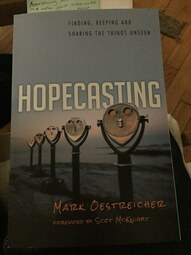For the last several years, I've participated in the One Word 365 project, selecting a word to anchor my year. My word for this year has been hope – chosen during a scary pregnancy related stint in the hospital in January.
In addition to anchoring my year, my word of the year is also something I consistently look for in other people and places; It's something I hope to learn about as I intentionally embrace it. For that reason, I was very excited to read Mark Oestreicher's new book about hope, Hopecasting.

One of my longtime struggles with hope has been defining it. For me, it's far easier to recognize than define. For this reason, I appreciated reading Oestreicher's definition of hope, as well as the process through which he derived it. According to him, “Hope is faithful confidence that God continues to author a story that moves us from vision to action.”
Having seen in my own life the way in which hope is often most visible during or after the bleakest, darkest times, I deeply resonated with Oestreicher's careful distinction between hope and optimism. To him, “real Hope, deep Hope, Hope that stretches well beyond optimism and wishful thinking – often leads us through terrain we'd rather avoid. Hope is a gift, not the result of effort.”
Although hope is not the result of our effort, in Hopecasting, Oestreicher creates a helpful diagram to explain what he calls the “process of hope”, something that will help readers to recognize and experience hope in their own lives. As part of this process, Oestreicher guides readers through an exploration of hope's enemies as well as ways in which to position themselves for hope, in part by practicing “unadorned, emotional honesty with God”. He beautifully models this by describing his own journey from exile to hope, vulnerably sharing journal entries from a time of exile in his life in order to demonstrate how he recognized the gift of hope God was giving him.
Throughout Hopecasting, Oestreicher excels at weaving together various stories of hope – his own, those of his friends, as well as characters from Scripture. His observations about characters from Scripture as they relate to hope will breathe new life into familiar stories – such as that of the wee little man, Zacchaeus.
To be clear, Hopecasting is a book that's hard to categorize. Although it contains elements of memoir, it's not a memoir. Although it's practical, it's a not a how-to book. Although it's theologically rich, it's not academic. Instead, it's a book that will help readers spot hope in their own lives and become agents of hope in the lives of others, something that's only possible because Oestreicher's theology of hope is so clearly rooted in Jesus. In his words, “A fullness of life burns most hot when I follow in the footsteps of Jesus and give my life away, bringing Hope to the hopeless. This, my friends, is hopecasting.”
Perhaps more than anything else, that's what Hopecasting has helped me realize: In this my year of hope, in addition to embracing hope in my own life, I long to help others do the same by participating in hopecasting in the world around me.